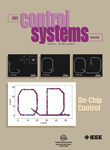Journal
Please choose volume & issue:
- Advertising & Sales
-
2024 International Conference on Unmanned Aircraft Systems [Conference Reports]
Keywords:Unmanned Aerial VehiclesUnmanned Aerial SystemsAircraft SystemsScience And TechnologyEnd-usersETH ZurichPerception Of The RobotFlight OperationsAbstracts:Provides society information that may include news, reviews or technical notes that should be of interest to practitioners and researchers.
-
The Roger W. Brockett Control Systems Award [Awards]
Keywords:Control SystemNumber Of FriendsLeaders In The FieldEngineering EducationLasting ImpressionAbstracts:Presents the recipients of The Roger W. Brockett Control Systems awards for 2024.
-
2024 IEEE CSS Awards [Awards]
Keywords:Control SystemControl TechnologyNomination ProcessIEEE TransactionsPaper AwardTechnical CommunityCo-authorsOptimal ControlPower SystemSystems EngineeringPractical SignificanceCalendar YearAutomatic ControlSystems ScienceSignificance For ApplicationsFlight ControlAward WinnersAbstracts:Presents the recipients of IEEE CSS awards for 2024.
-
João Manoel Gomes da Silva Jr. [People In Control]
Keywords:InterviewsControl In PeopleControl SystemStability Of SystemLinear SystemNonlinear SystemsFirst ContactElectrical EngineeringControl FieldProportional-integral-derivativeGraduate ProgramsPromising OpportunitiesNonlinear ElementSemidefinite ProgrammingGraduate CoursesActuator SaturationPole Placement
-
Unsupervised Representation Learning in Deep Reinforcement Learning: A Review
Keywords:Representation learningGeometryUncertaintySystematicsDeep reinforcement learningMarket researchRobustnessEncodingDynamical systemsUnsupervised learningClosed boxBenchmark testingMeasurement techniquesPerformance evaluationData analysisDeep LearningUnsupervised LearningRepresentation LearningDeep Reinforcement LearningUnsupervised Representation LearningNeural NetworkSystem DynamicsLatent VariablesState VariablesState SpaceControl ProblemPhysical SystemOptimal PolicyState RepresentationSampling EfficiencyOpen ChallengesMarkov Decision ProcessPhysical LawsMeaningful RepresentationLow-dimensional RepresentationLatent SpaceLatent ModelForward ModelLatent StateReward ModelDeep Reinforcement Learning AlgorithmContrastive LossVariational AutoencoderReconstruction LossMarkov Decision Process ModelAbstracts:This review article addresses the problem of learning abstract representations of measurement data in the context of deep reinforcement learning. While the data are often ambiguous, high-dimensional, and complex to interpret, many dynamical systems can be effectively described by a low-dimensional set of state variables. Discovering these state variables from the data is a crucial aspect for 1) improving the data efficiency, robustness, and generalization of DRL methods; 2) tackling the curse of dimensionality; and 3) bringing interpretability and insights into black-box DRL. This review provides a comprehensive and complete overview of unsupervised representation learning in DRL by describing the main DL tools used for learning representations of the world, providing a systematic view of the method and principles; summarizing applications, benchmarks, and evaluation strategies; and discussing open challenges and future directions.
-
Extremum Seeking Through Delays and PDEs [Bookshelf]
Keywords:Partial Differential EquationsExtremum SeekingOrdinary Differential EquationsControl FieldNon-cooperative GameInfinite-dimensional SystemsData-driven LearningAbstracts:Presents reviews for the following list of books, Extremum Seeking Through Delays and PDEs.
-
Aradhana Nayak [PHDs in Control]
Keywords:InterviewsMechanical SystemsControl TechnologyPromising Area
-
Introduction [PHDs in Control]
Keywords:Inverse Reinforcement Learning
-
The Arrow of Time in Estimation and Control: Duality Theory Beyond the Linear Gaussian Model
Keywords:Linear systemsStochastic systemsHidden Markov modelsEstimationObservabilityGaussian processesControl theoryLinear ModelDual TheoryLinear GaussianLinear Gaussian ModelArrow Of TimeOptimization ProblemNonlinear ModelOptimal ControlLinear SystemNonlinear SystemsHidden Markov ModelMinimum VarianceEstimation ProblemTime-reversalOptimal Control ProblemDual ProblemOptimal FilterRiccati EquationNonlinear FilterGraduate CoursesDeterministic ControlStochastic Differential EquationsControl InputDual ControlSpace Of FunctionsDifferential EquationsConditional ExpectationDual SystemAdjoint EquationsAbstracts:The duality between estimation and control is a foundational concept in control theory. Most students learn about the elementary duality—between observability and controllability—in their first graduate course in linear systems theory. Therefore, it comes as a surprise that for a more general class of nonlinear stochastic systems (HMMs), duality is incomplete. Our objective in writing this article is twofold: 1) to describe the difficulty in extending duality to HMMs and 2) to discuss its recent resolution by the authors. A key message is that the main difficulty in extending duality comes from time reversal when going from estimation to control. The reason for time reversal is explained with the aid of the familiar linear deterministic and linear Gaussian models. The explanation is used to motivate the difference between the linear and the nonlinear models. Once the difference is understood, duality for HMMs is described based on our recent work. The article also includes a comparison and discussion of the different types of duality considered in the literature.
Hot Journals
- Risk Breakdown Matrix for Risk-Based Inspection of Transportation Infrastructure Projects
- Social Control in Outsourced Architectural and Engineering Design Consulting Projects: Behavioral Consequences and Motivational Mechanism
- 2022 Best Paper Award
- Hold-Ups and Failures in Negotiated Order: Unearthing the Nuances of Rework Causation in Construction
- Prevalence and Risk Factors for Poor Mental Health and Suicidal Ideation in the Nigerian Construction Industry
- Impact of Wind Load Characteristics on Computed Bridge Stay-Cable Forces Used for Bridge Health Monitoring
- Weak-End and Frequency Detection of Elastically Supported Bridges by Contact Residual Response of Two-Axle Test Vehicle in a Round Trip
- Development of Performance-Based Fragility Curves of Coastal Bridges Subjected to Extreme Wave-Induced Loads
- An Analytical Model to Evaluate Short- and Long-Term Performances of Post-Tensioned Concrete Box-Girder Bridges Rehabilitated by an Ultrahigh-Performance Concrete Overlay
- Experimental and Numerical Studies on Dynamic Response of Parallel Wire Cables Subjected to Close-In Explosions
- Three-Dimensional Velocity Distribution in Straight Smooth Channels Modeled by Modified Log-Law
- Experimental Investigation on Flow Past Two and Three Side-by-Side Inclined Cylinders
- An Experimental Investigation of Rotor–Box Aerodynamic Interaction 1
- Modeling Gas–Liquid Flow Between Rotating and Nonrotating Annular Disks
- Entry Length Requirements for Two- and Three-Dimensional Laminar Couette–Poiseuille Flows
Acta Astronautica (1,768)
- Mixed-integer trajectory optimization with no-fly zone constraints for a hypersonic vehicle
- Adaptive control design for active Pogo suppression of large strap-on liquid launch vehicles
- Machine learning based approach for modeling and forecasting of GPS–TEC during diverse solar phase periods
- Effect of two-dimensional micro-cavity surface on hypersonic boundary layer
- Investigation on burning behaviors of aluminum agglomerates in solid rocket motor with detailed combustion model
Advanced Materials (3,745)
- Structured Perovskite Light Absorbers for Efficient and Stable Photovoltaics
- Strategies for High‐Performance Solid‐State Triplet–Triplet‐Annihilation‐Based Photon Upconversion
- Atomic Engineering Catalyzed MnO2 Electrolysis Kinetics for a Hybrid Aqueous Battery with High Power and Energy Density
- Crystal Adaptronics: Global Performance Indices for Dynamic Crystals as Organic Thermal Actuators (Adv. Mater. 20/2020)
- Enlightening Materials with Photoswitches








 User Center
User Center My Training Class
My Training Class Feedback
Feedback





